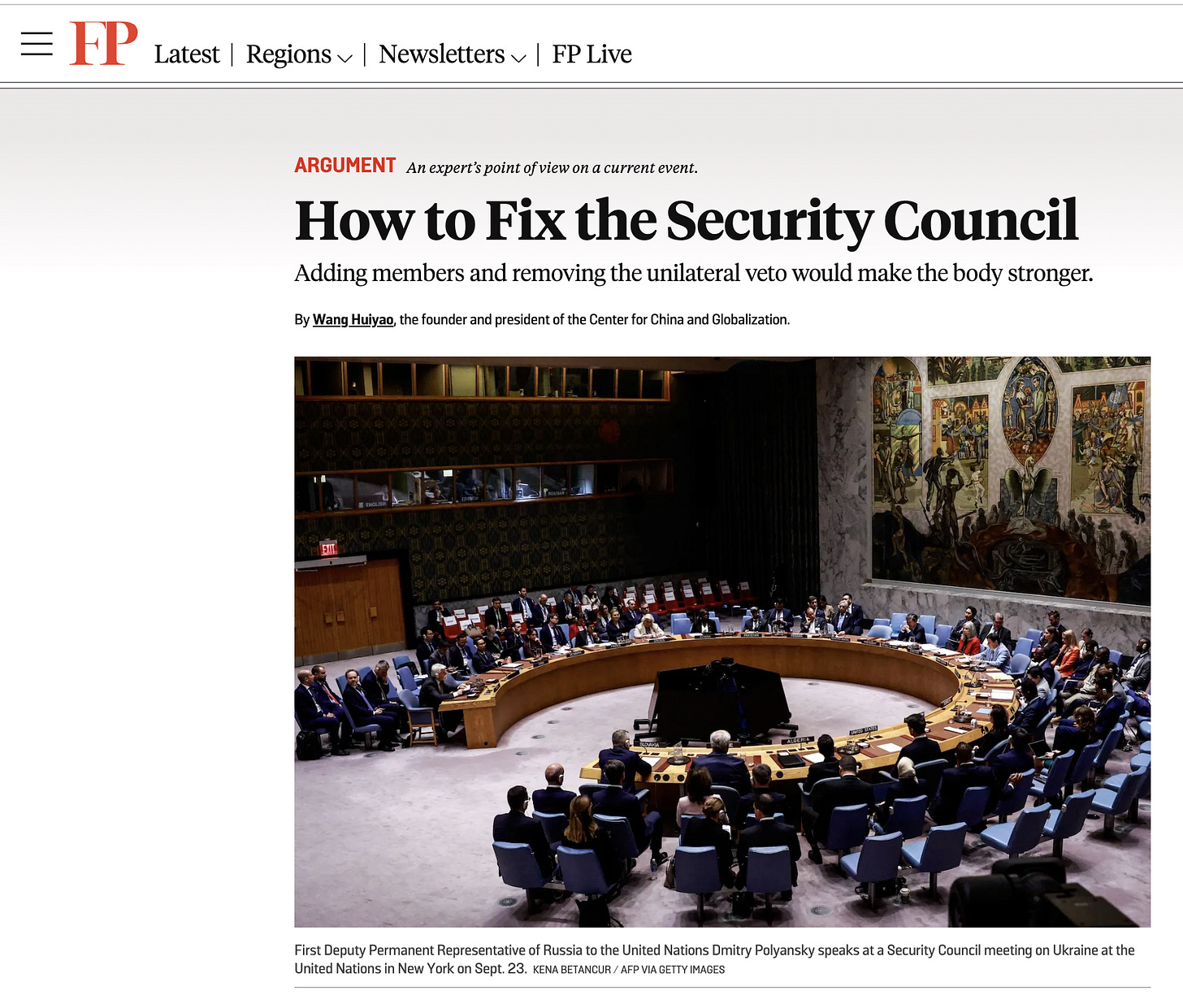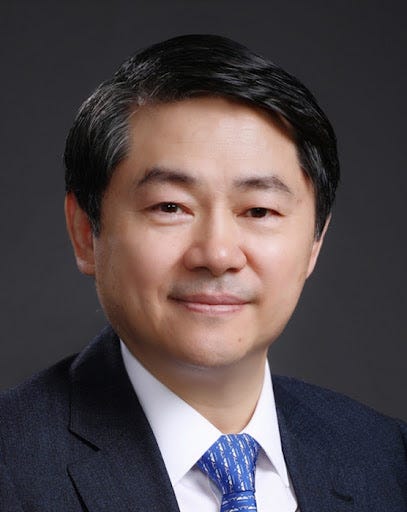How to Fix the Security Council
Adding members and removing the unilateral veto would make the body stronger.
First published in Foreign Policy on September 30, 2025.
By Wang Huiyao, the founder and president of the Center for China and Globalization.
At the 80th United Nations General Assembly high-level debates last week, a host of global leaders called for a more effective and representative Security Council. In the words of Finnish President Alexander Stubb: “If countries from the global south, from Latin America, from Africa, from Asia, do not get agency in the system, they will turn their backs against the United Nations.”
Indeed, the council’s shortcomings are playing out all too clearly today in Gaza and Ukraine. The U.S. has used its unilateral veto to block a host of resolutions calling for a cease-fire in Gaza, enabling the genocidal conflict to continue. Meanwhile, Russia has consistently blocked any meaningful Security Council response to the war in Ukraine since 2022, despite international condemnation and profound humanitarian suffering.
But despite the Security Council’s flaws, there is no real substitute for it. If it drifts into irrelevance, this would simply remove the last vestiges of effective global coordination. The challenge, then, is not whether to reform the council, but how to do so.
It is against this backdrop that Chinese President Xi Jinping launched a new Global Governance Initiative. Xi is calling for a fairer and more inclusive multilateral system, one without double standards that places the United Nations at its core.
To realize this global vision, the Security Council should enact structural and procedural reform. First, the council should expand its membership to better reflect the world of today. Second, it should develop a mechanism to limit the use of unilateral vetoes to prevent a single state from standing athwart an international consensus. Together, these reforms can revitalize the Security Council’s credibility and capacity, transforming it from a forum of gridlock into a more responsive and effective guardian of the peace.
The Security Council’s current structure—five permanent members and 10 rotating nonpermanent members—reflects, at best, the geopolitical realities at the time of the last set of Security Council reforms in 1965. This structure should be updated by adding a new class of associate permanent member seats.
To that end, all current G-21 (formerly G-20) members should be given a seat on an expanded Security Council. This would eliminate the 10 existing rotating seats and create 16 new permanent associate seats. These new states would not have an individual veto, but together with the other four permanent members, they could override the use of the unilateral veto.
This would preserve the institutional legacy of the original five full members, while elevating voices that reflect today’s multipolar economic and political order. In doing so, it would enhance the council’s legitimacy, improve regional representation, and embed the Security Council more firmly within the real architecture of the current global order.
Previous reform efforts have stumbled over the question of how to allot new seats in the council. Here, the G-21 offers an elegant solution. It is comprised of an even mix of developed and developing countries. Using it as the basis for reform addresses some of the underrepresentation of the global south while still recognizing the enduring power of incumbents. Today, the G-21’s members comprise over 85 percent of global GDP, and has already helped coordinate multilateral responses to some of the world’s most pressing economic challenges. Under this new model the expanded U.N. Security Council would consist of Argentina, Australia, Brazil, Canada, China, France, Germany, India, Indonesia, Italy, Japan, South Korea, Mexico, Russia, Saudi Arabia, South Africa, Turkey, the United Kingdom, and the United States, along with the African Union and the European Union, which would each have one collective vote.
The second reform necessary to restore function is a procedural one. The unilateral veto has created paralysis in the Security Council, allowing even urgent humanitarian measures to be stalled indefinitely. To this day, the veto has seen use a staggering total of 324 times in less than 80 years at an average rate of four vetoes a year. This includes 159 vetoes by the Soviet Union or Russian Federation, 94 by the United States, 32 by the U.K., 21 by China, and 18 by France.
Even seemingly straightforward matters, such as the admission of new members, can become mired in contention as the Soviet Union adroitly demonstrated early in the Cold War and as the United States demonstrates today in blocking Palestinian membership. Beyond this, the impact of the veto is likely worse than we can see. Its looming presence ensures that many resolutions are killed behind closed doors in private conversation, as those drafting the documents are quietly informed that their resolutions will be vetoed.
Previous reform initiatives have attempted to tackle the veto problem. The French-Mexican proposal, first advanced in 2013, called for permanent members to voluntarily suspend their veto in cases of mass atrocities. The Accountability, Coherence, and Transparency Group later advanced a code of conduct, now supported by more than 120 states, that urges P5 states to restrain from using their vetoes in situations of genocide, crimes against humanity, or war crimes.
But a more substantial fix is required. To solve the problems created by the unilateral veto, we must weaken it by instituting a supermajority override. Under this proposal, if over two-thirds of the expanded Security Council, that is to say 15 of its members, and two-thirds of the General Assembly voted to override the veto of a single P5 member, the resolution in question would pass.
After all, if two-thirds of both bodies can agree to override a single P5 member veto, it clearly represents a broad international consensus. A singular P5 member should not be able to block a UNSC resolution passed by all other permanent members, two-thirds of the other 16 permanent associate members, and two-thirds of the 193 members in the General Assembly.
This new proposal would benefit countries in the global south that previously were unable to meaningfully take part in international rulemaking and security due to inviolable vetoes from above. At the same time, there is no reason for existing P5 members to fear the consequences of this reform. The P5 would still be able to impose a binding veto on any resolution so long as at least two members were in agreement. This would offer some reassurance, even as it prevented a single power from derailing collective action and raised the political cost of casting a veto in the first place.
This simple change would have immediate ramifications. From Yemen to Gaza, it would open the door to resolving conflicts that have gone from ugly to horrific. The removal of the unilateral veto would break down the barrier that has all too often kept U.N. peacekeepers and relief efforts from addressing some of the worst tragedies in history.
Reforming the U.N. would signal a renewed commitment to the founding ideals of the United Nations—peace, cooperation, justice, human rights, and shared responsibility. The result would be a Security Council better suited for the present and better prepared for the future.
Wang Huiyao is the founder and president of the Center for China and Globalization, a nongovernmental think tank based in Beijing. Wang often advises the Chinese government.





Dr. Wang Huiyao's proposal for Security Council reform represents a necessary reckoning with the body's fundamental design flaw: a structure born from victor's privilege rather than universal principle. The UN Charter's preamble declares the determination of "WE THE PEOPLES" to establish conditions for justice and maintain peace, yet Article 27's veto provision, imposed through coercion at San Francisco when US Senator Tom Connally literally tore up the Charter and threatened smaller nations that opposition to the unanimity principle would mean "no Charter at all", created an architecture of paralysis. The current crisis validates Finnish President Alexander Stubb's warning that without genuine agency for the global south, nations will abandon the system entirely. Dr. Wang's G-21 expansion model addresses this democratic deficit elegantly, but it requires deeper structural surgery. Beyond his proposed associate membership, the Council should adopt a three-tiered system: five legacy permanent members retaining diminished veto authority; twenty permanent seats with rotating regional representation from all continents (ensuring Africa, Latin America, and Asia each hold multiple voices); and a fluid crisis membership allowing directly affected nations temporary voting rights during conflicts concerning their regions, fulfilling the Charter's Article 2 promise of "sovereign equality of all Members" in practice, not merely principle.
The veto's corruption of the Council's moral authority stems from its transformation from a conflict-prevention mechanism into a license for complicity in atrocity. As the UN's own documentation reveals, 324 vetoes in less than eighty years, averaging four annually, have created what amounts to feudal sovereignty over global conscience. The year 2023 witnessed consensus proving elusive, with veto-casting permanent members primarily the United States and the Russian Federation impeding swift, effective action to address deteriorating situations worldwide. The humanitarian cost is staggering: American vetoes shielding Israeli actions in Gaza despite mass civilian casualties, Russian vetoes blocking Ukraine resolutions while cities burn. Dr. Wang's supermajority override requiring two-thirds of both an expanded Council and the General Assembly represents a crucial step, yet it remains insufficient. The reform must include automatic veto suspension during declared humanitarian emergencies involving crimes against humanity or genocide, as determined by the International Court of Justice, not by the Security Council itself. Article 24 charges the Council with acting on behalf of all members in maintaining peace, but this delegated authority should be revocable when weaponized against the Charter's Article 1 purpose: "to take effective collective measures for the prevention and removal of threats to the peace."
The reason why Veto power were given in the first place is to avoid war among major powers which could escalate into World War III, something that the UN is created to help prevent from happening. And I think it serves that purpose well over the last 80 years. Let’s keep that.
I am opened to add more permanent members, but with no Veto power. It makes sense that India, Brazil, South Africa and Japan would always have the seats at the UNSC, given their population size and economic leverage. But Veto power should be kept with the existing five for now. UK or France may withdraw itself afterward and give the seat to EU if they think it is more appropriate.